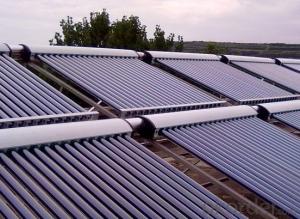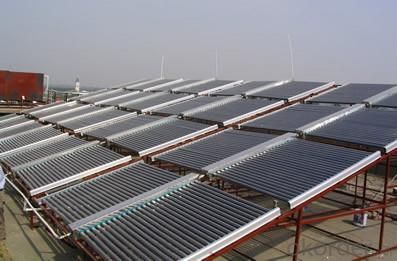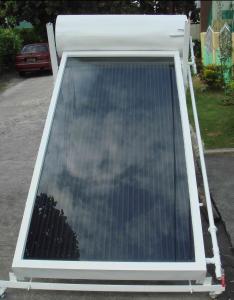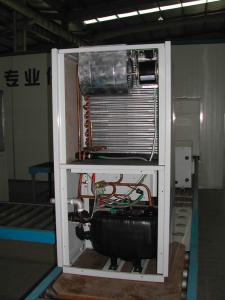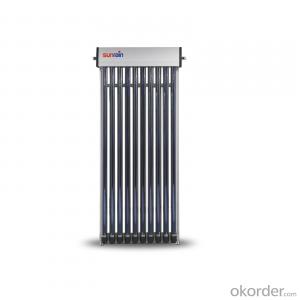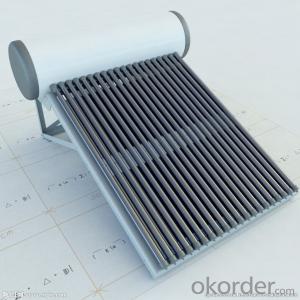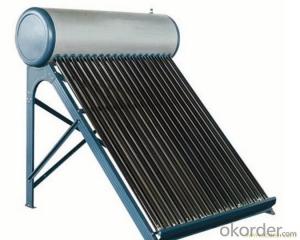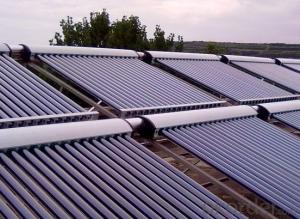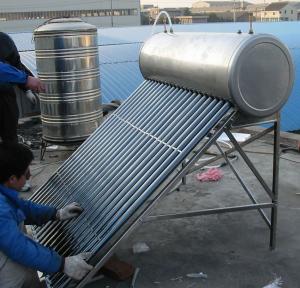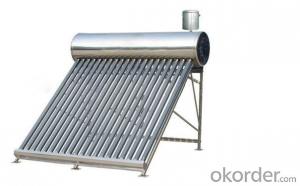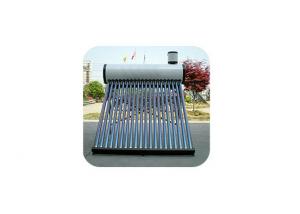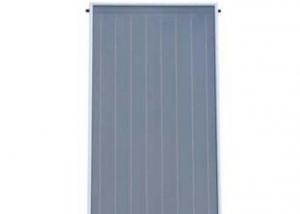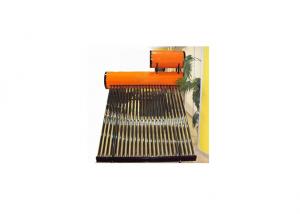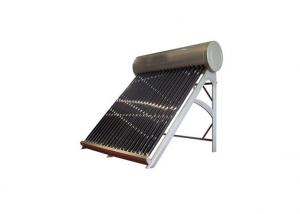Solar Water Heater Tanks - Unpressurized Vacuum Tube Solar Heater Supplier in China
- Loading Port:
- China main port
- Payment Terms:
- TT OR LC
- Min Order Qty:
- 10 set
- Supply Capability:
- 10000 set/month
OKorder Service Pledge
OKorder Financial Service
You Might Also Like
Introduction of Non-Pressure Solar Water Heater:
Non-pressure Solar Heater is one of the most economical solar water heating device with pretty high efficiency at the same time. It consists of hot water storage tank, solar vacuum tubes with mouth plug in storage tank, and bracket supporting tank and tubes.When cold water in evacuated tubes is heated with solar irradiation, as the specific gravities of hot water and cold water are different, hotter water goes upward to storage tank and colder water goes downward to glass tubes. through this continuous circulation, the cold water in storage tank will be gradually heated till sunset.
Solar water heaters working principle
1. The solar collector absorbs solar energy and transmits it to the solar water heater tank through circulation
2. When the temperature of the collector reaches the set value, the controller starts the circulation pump automatically
3. The circulation pump makes heat-conducting liquid circulate automatically
4. The heat-conducting liquid transfers heat to water by lower heat exchanger in the water tank.
5. When the temperature difference between solar collector and heat pipe solar water heaters tank doesn't reach the set value, the circulation pump will be shut automatically
6. In case the temperature of the water tank does not reach Tmax, Electric Heating Element will start to work automatically
Solar water heaters working station component:
1. Operating screen
2. Manometer
3. Pump speed adjust switches
4. Temperature difference circulation pump
5. Flow rate indicator
6. Return circuit connector
7. Safety valve
8. Expansion vessel connector9. Return circuit connector
10. Wall mounting
11. Expansion vessel:8L
12. Pressure resistance: 10 bar pressure for expansion vessel
Solar water heaters specification:
Description | solar water heaters |
Material of out manifold | 0.55mm thickness color steel/ fluorine carbon steel |
Material of inner tank | Food grade 2.0 mm thickness SUS304 stainless steel |
Tank insulating layer | 40mm 45kg/m³ high-density polyurethane foamed |
Inlet and outlet hole | Male G1'' |
Max pressure | 0.6 Mpa |
Solar collector tube | 3.3 Borosilicate glass with N/Al coating |
Thickness of glass tube | 1.6mm |
Vacuum tube tightness | P≤0.005 Pa |
Absorption | as=0.93-0.96 (AM1.5) |
Emission ratio | εh=0.04-0.06 (80C±5C) |
Idle sunning property parameters | Y=220~260m2.C/KW |
Average heat loss coefficient | ULT=0.6~0.7W/(m2.C) |
Bracket: | 2.0mm thickness aluminum alloy |
Tank weight | 75KGS |
Tank size | 560mm Dia x 1810mm Height |
Tank capacity | 300L |
Solar collector | 2pcs 58x1800x15tube solar collector |
Absorber area | 2.811 m² |
Working station | SP116 working station |
Heat exchanger length | Upper:12m, Underside:18m |
Solar water heaters details show:
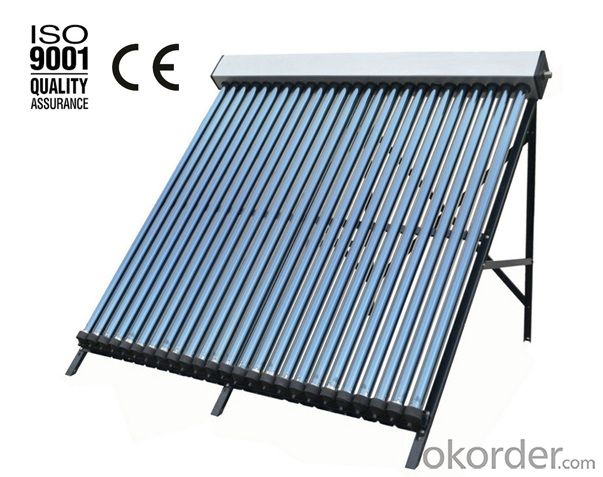
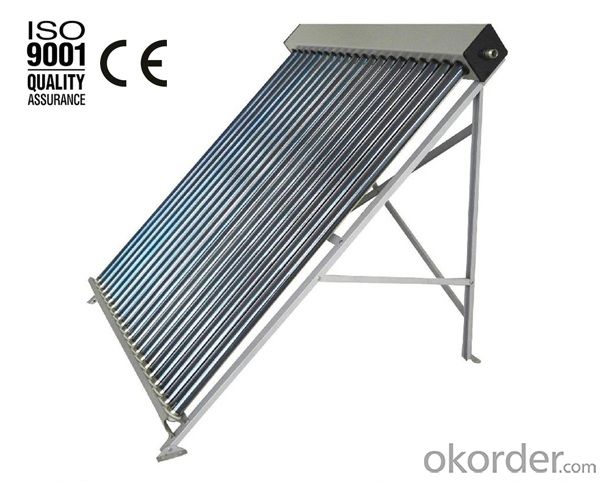
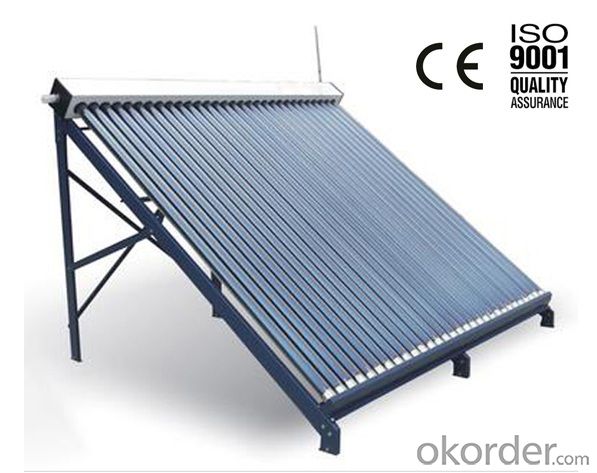
Benefits of this kind of solar water heaters:
1. Prolong the life of your existing water heater
2.Costs less than an electric, gas or oil water heater
3.No maintenance required
4.Lasts longer than a traditional hot water heater
5.Reduce your water heating costs
- Q: How does the size of a solar water heater system affect its performance?
- The size of a solar water heater system directly affects its performance. A larger system with a greater surface area for solar absorption can generate more heat and produce hot water more efficiently. It can also accommodate a higher demand for hot water, making it suitable for larger households or commercial applications. Conversely, a smaller system may struggle to meet the hot water needs of a larger household or may take longer to heat the water. Therefore, choosing the right size of a solar water heater system is crucial to ensure optimal performance and efficiency.
- Q: What is the expected lifespan of the temperature sensors in a solar water heater?
- The expected lifespan of temperature sensors in a solar water heater can vary depending on various factors such as the quality of the sensors, the operating conditions, and maintenance practices. However, on average, temperature sensors in a solar water heater can last anywhere from 5 to 10 years.
- Q: Can a solar water heater be used in areas with high levels of wind erosion?
- Yes, a solar water heater can be used in areas with high levels of wind erosion. The performance of the heater may not be affected by wind erosion, as the primary source of energy is sunlight and not wind. However, it is important to ensure that the solar water heater is properly installed and secured to withstand strong winds in these areas.
- Q: How does the tilt of the solar panels affect the performance of a solar water heater?
- The tilt of solar panels plays a crucial role in the performance of a solar water heater. The angle at which the panels are tilted determines the amount of sunlight they can capture and convert into heat energy. Optimal tilt angles ensure maximum exposure to the sun's rays, resulting in higher efficiency and better performance of the solar water heater.
- Q: Can a solar water heater be used in areas with limited access to skilled workforce or trained technicians for installation or maintenance?
- Yes, a solar water heater can be used in areas with limited access to skilled workforce or trained technicians for installation or maintenance. Solar water heaters are designed to be relatively simple systems that can be installed and maintained by individuals with basic technical skills. They often come with detailed installation and maintenance manuals that provide step-by-step instructions for the process. Additionally, many solar water heater manufacturers offer training programs and resources that can help individuals in these areas learn the necessary skills for installation and maintenance. These resources may include online tutorials, video guides, or even on-site training sessions. By providing accessible and user-friendly resources, manufacturers aim to empower individuals in areas with limited access to skilled labor to install and maintain solar water heaters themselves. Furthermore, solar water heaters are generally designed to be durable and require minimal maintenance. They are built with high-quality materials and components that can withstand various weather conditions and last for many years with minimal maintenance. This reduces the need for frequent technical interventions, making them suitable for areas where skilled workforce or trained technicians may be scarce. Overall, while having access to skilled workforce or trained technicians can be beneficial, it is possible to install and maintain a solar water heater in areas with limited access to such resources. With proper guidance, training, and durable design, individuals in these areas can successfully utilize solar water heaters to meet their hot water needs.
- Q: How does the temperature of the water affect the efficiency of a solar water heater?
- The temperature of the water directly impacts the efficiency of a solar water heater. Higher water temperatures increase the efficiency as the solar panels can transfer more heat to the water. Conversely, lower water temperatures decrease efficiency as the solar panels have a harder time transferring heat.
- Q: Can a solar water heater be used in areas with limited biofuel resources?
- Yes, a solar water heater can certainly be used in areas with limited biofuel resources. Solar water heaters rely on the energy from the sun to heat water, making them independent of biofuel resources. They are a sustainable and renewable alternative to traditional water heaters, making them a viable option in areas where biofuel resources are scarce or limited.
- Q: Can a solar water heater be used in areas with limited access to reliable weather forecasting or solar radiation data?
- Yes, a solar water heater can still be used in areas with limited access to reliable weather forecasting or solar radiation data. While accurate weather data and solar radiation information can help optimize the performance of a solar water heater, they are not essential for its basic operation. Solar water heaters primarily rely on sunlight to heat up water, and as long as there is sufficient sunlight available, the heater will still be able to function effectively. Even in areas with unpredictable weather patterns or limited sunshine, solar water heaters can still provide a significant amount of hot water. In such areas, it is advisable to install a properly sized solar water heater system to ensure that it can meet the water heating needs even during periods of lower solar radiation. Additionally, incorporating a backup heating source such as an electric or gas-powered water heater can provide hot water during extended cloudy periods or when solar radiation is insufficient. While having access to reliable weather forecasting or solar radiation data can certainly help in maximizing the efficiency of a solar water heater, it is not a prerequisite for its usage. With proper installation, sizing, and backup options, solar water heaters can still be a viable and sustainable solution for hot water production in areas with limited access to reliable weather data.
- Q: How does a solar water heater perform in areas with high levels of air humidity?
- A solar water heater can still perform well in areas with high levels of air humidity. Although humidity can affect the efficiency of the system to some extent, it does not completely hinder its performance. The key factor is the availability of sunlight, which is necessary for the solar panels to convert solar energy into heat. As long as there is sufficient sunlight reaching the panels, the solar water heater can still effectively heat water, even in humid environments.
- Q: How does the water quality of a solar water heater compare to a traditional water heating system?
- The water quality of a solar water heater is generally comparable to that of a traditional water heating system. Both systems rely on water from the same source, such as a municipal supply or a well. However, solar water heaters have an advantage in terms of reducing mineral and sediment buildup, as they often use a separate storage tank with a heat exchanger. This can help improve the overall water quality by minimizing the accumulation of impurities.
Send your message to us
Solar Water Heater Tanks - Unpressurized Vacuum Tube Solar Heater Supplier in China
- Loading Port:
- China main port
- Payment Terms:
- TT OR LC
- Min Order Qty:
- 10 set
- Supply Capability:
- 10000 set/month
OKorder Service Pledge
OKorder Financial Service
Similar products
Hot products
Hot Searches
Related keywords
